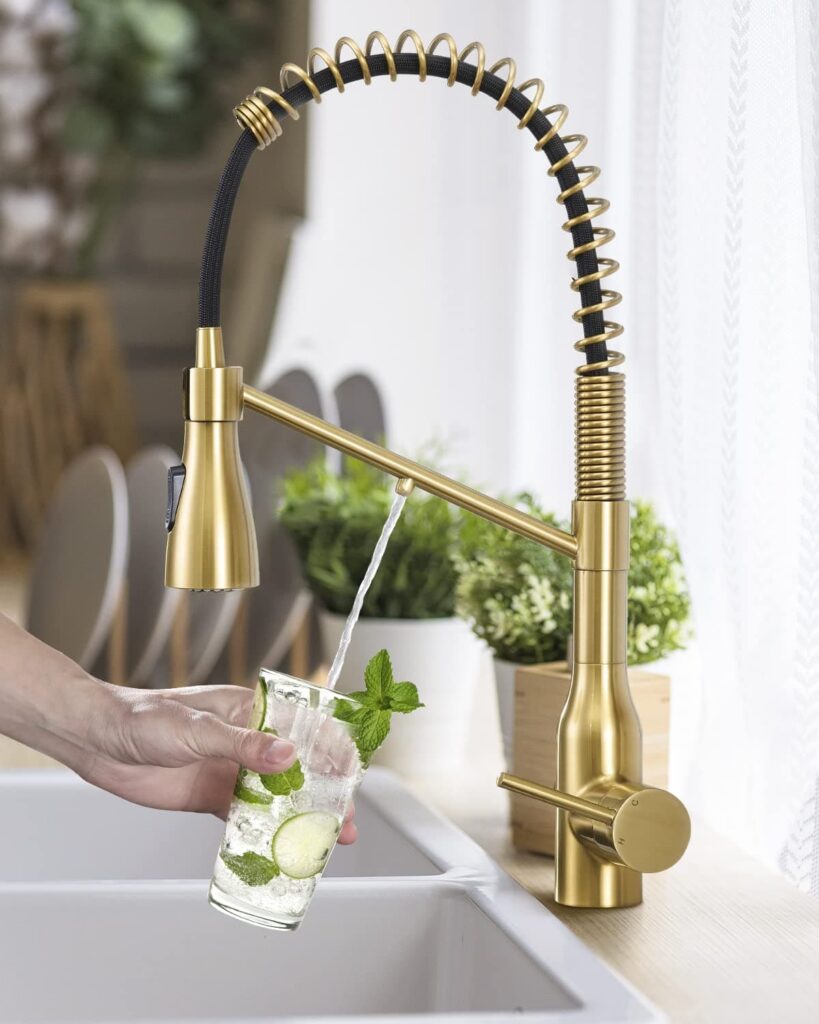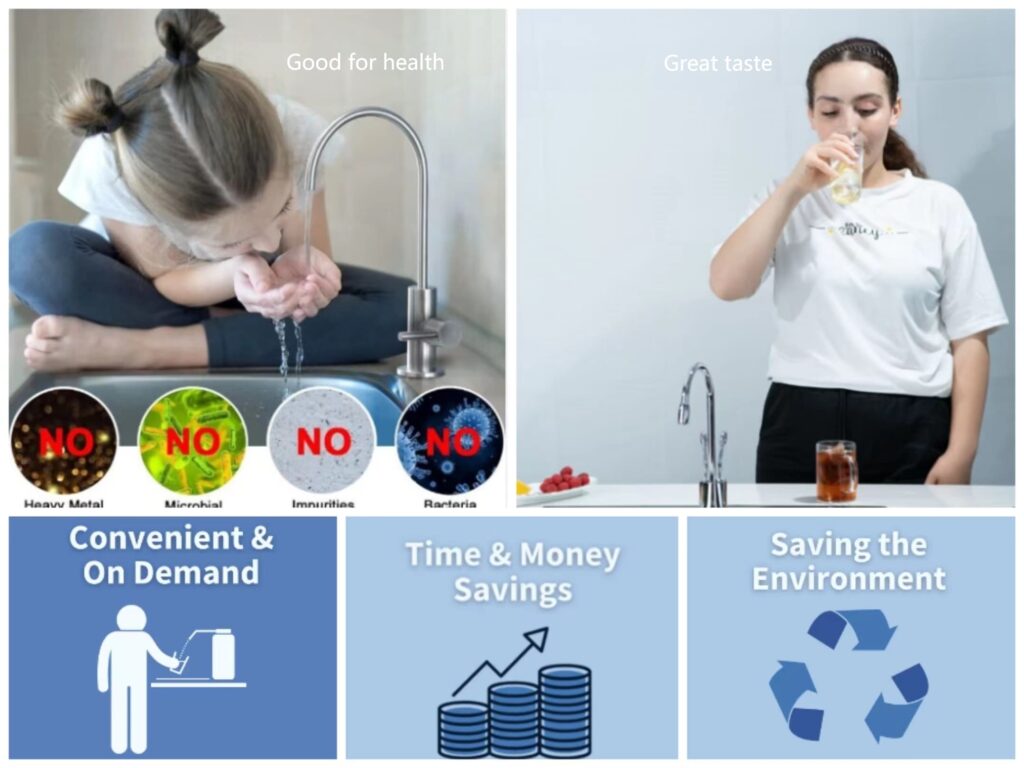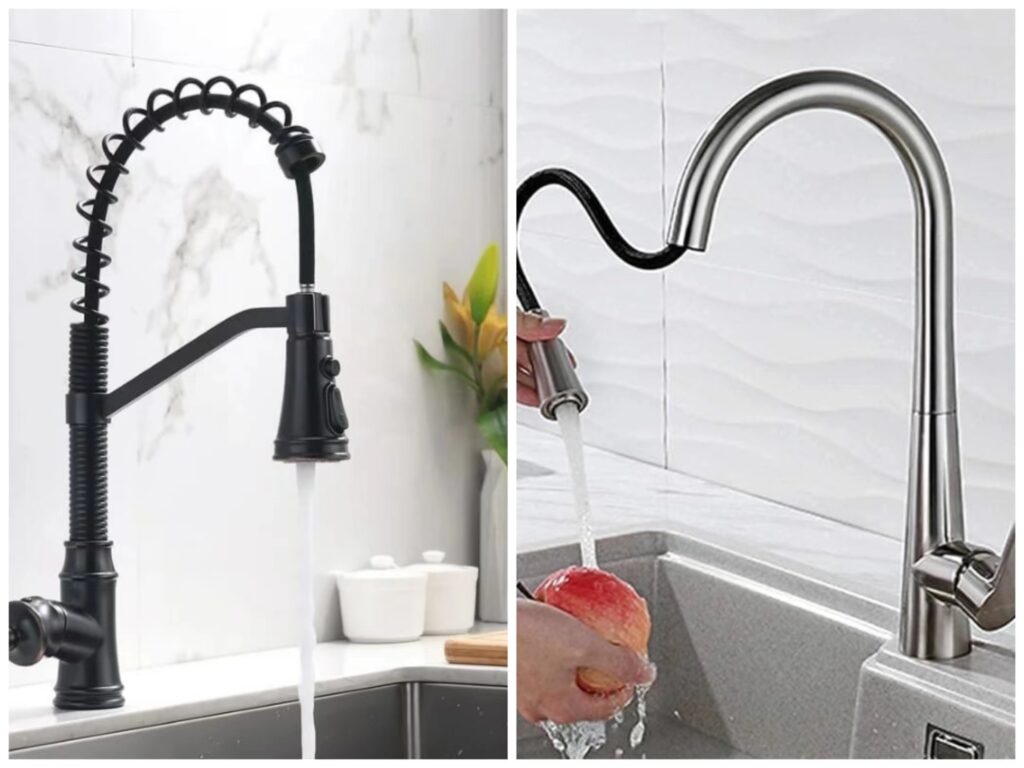Negli ultimi anni, l’importanza dell’acqua potabile pulita e sicura è diventata una preoccupazione fondamentale per molti proprietari di case.
L'integrazione dei sistemi di filtrazione dell'acqua direttamente nei rubinetti della cucina è emersa come una soluzione innovativa e pratica a questa necessità.
I rubinetti della cucina con filtri integrati offrono la comodità di acqua potabile purificata direttamente dal rubinetto, Eliminare la necessità di dispositivi di purificazione separati e acqua in bottiglia.

Questi rubinetti sono diventati un punto focale nel design moderno della cucina, non solo fungere da strumento funzionale, ma anche aggiungendo al fascino estetico generale dello spazio.
Il design e la funzionalità dei rubinetti della cucina con filtrati distributori d'acqua Vary ampiamente, soddisfare diverse preferenze e requisiti.
Da elegante, Modelli a discesa che si fondono perfettamente con interni contemporanei, a stili più tradizionali che evocano una sensazione classica, C'è un rubinetto per abbinare qualsiasi arredamento da cucina.
Una caratteristica chiave di questi rubinetti è il processo di filtrazione a più stadi, che garantisce che contaminanti come il cloro, Guida, e altre impurità vengono effettivamente rimosse dall'acqua.
Ciò si traduce non solo in acqua che è più sicura da bere, ma ne migliora anche il gusto e l'odore, rendendolo ideale per cucinare e bere.
I proprietari di case apprezzano anche i risparmi sui costi a lungo termine e i vantaggi ambientali che derivano dall'installazione di un rubinetto da cucina con un filtro dell'acqua.
Riducendo la dipendenza dall'acqua in bottiglia, Le famiglie possono risparmiare e ridurre al minimo i loro rifiuti di plastica, Contribuire a un pianeta più sano.
La manutenzione di questi sistemi è semplice, di solito richiede solo un cambio periodico della cartuccia del filtro, che può variare nella durata della vita a seconda del modello e dell'uso.
Poiché l'acqua pulita diventa sempre più cruciale per il benessere, Si prevede che la domanda di rubinetti da cucina con distributori di acqua filtrati continuerà a crescere, rendendoli un investimento saggio sia per la salute che per la casa.
Comprensione di rubinetti da cucina con distributori di acqua filtrata
Rubinetti da cucina con distributori di acqua filtrati integrati Offrire un modo comodo ed efficiente per accedere all'acqua pulita direttamente dal rubinetto.
Sono dotati di vari tipi di sistemi di filtrazione migliorare la qualità dell'acqua rimuovendo impurità e contaminanti.
Nozioni di base sulla filtrazione dell'acqua
Al centro, La filtrazione dell'acqua prevede la rimozione di sostanze indesiderate dall'acqua per renderla più sicura e più appetibile per bere.
La filtrazione semplice può comportare una varietà di processi, comprese barriere fisiche come Carbonia attivata o tecniche più avanzate come osmosi inversa o Filtri UV.
Attraverso questi metodi, particelle, patogeni, e anche le sostanze chimiche sono mirate e ridotte, con conseguente produzione di acqua più pulita.
- Carbonia attivata: Lavora con le impurità adsorbenti mentre l'acqua passa attraverso.
- Osmosi inversa: Utilizza una membrana semi-permeabile per rimuovere una vasta gamma di contaminanti.
- Filtri UV: Impiegare la luce ultravioletta per disinfettare l'acqua eliminando batteri e virus.

Diversi tipi di filtri
Esistono diversi tipi di filtro che possono essere integrati in un rubinetto da cucina:
- Filtri standard: Utilizzare in genere il carbonio attivo che è efficace per migliorare il gusto e l'odore rimuovendo il cloro e altri contaminanti comuni.
- Filtri di osmosi inversa: Offrire un livello più elevato di filtrazione, in grado di rimuovere una percentuale significativa di solidi e contaminanti disciolti.
- Ionizzatori alcalini: Sollevare il livello di acqua pH attraverso un processo chiamato scambio ionico, producendo acqua alcalina.
Filtri UV: L'ultima tecnologia di filtrazione, Questi usano la luce ultravioletta per disinfettare l'acqua, efficace contro batteri e virus.
Vantaggi dei rubinetti ad acqua filtrati
I rubinetti dell'acqua filtrati integrano sistemi di purificazione avanzati direttamente nel rubinetto della cucina, Offrire non solo comodità, ma anche garantire che l'acqua che beva sia priva di contaminanti sgraditi. Offrono significativi vantaggi per la salute, ridurre l'impatto ambientale, e offrire risparmi sui costi a lungo termine.

Vantaggi per la salute
I rubinetti dell'acqua filtrati sono progettati per rimuovere contaminanti dannosi come Guida, cloro, e altri particolati che possono essere presenti nell'acqua potabile.
Installando un filtro direttamente sul rubinetto, Le famiglie possono migliorare la purezza e il gusto della loro acqua, che è essenziale per il benessere.
IL Migliori filtri dell'acqua di rubinetto di 2024 | NOI. Notizia Evidenzia i sistemi che non sono solo approvati per l'efficacia, ma assicurano anche che l'acqua sia priva di inquinanti che potrebbero altrimenti comportare rischi per la salute.
Impatto ambientale
L'uso di un rubinetto con un filtro dell'acqua incorporato può anche avere un impatto positivo sull'ambiente.
Riducendo la dipendenza dall'acqua in bottiglia, si contribuisce in modo significativo a ridurre i rifiuti di plastica.
Questi filtri riducono anche i requisiti di trattamento delle acque e il consumo di energia associati alla produzione di acqua in bottiglia, che avvantaggia notevolmente l'ambiente.
L'efficienza di questi sistemi, come dettagliato nelle recensioni come Il miglior filtro dell'acqua montato su rubinetto di 2024 | Recensioni di WireCutter, mostra che i sistemi di rubinetto filtrati rispondono alle sfide ambientali promuovendo il consumo di acqua sostenibile.
Costo-efficacia
L'installazione di un rubinetto d'acqua filtrato può essere un investimento economico a lungo termine.
Invece di acquistare continuamente acqua in bottiglia, Un filtro del rubinetto fornisce acqua potabile pulita a una frazione del costo.
Inoltre, I modelli di alta qualità progettati per filtrare i contaminanti e migliorare il gusto dell'acqua possono potenzialmente estendere la durata della durata degli elettrodomestici da cucina prevenendo l'accumulo di minerali.
La durata e la lunga durata del filtro di alcuni modelli, come quelli trovati in Miglior filtro per l'acqua del rubinetto budget, tradurre anche in risparmio sui costi di manutenzione e sostituzione, rendendoli un'aggiunta pratica a qualsiasi budget per la famiglia.
Opzioni di design e stile
Quando Selezione di un rubinetto da cucina con a distributore di acqua filtrata, Si può trovare una gamma di opzioni di progettazione. Questi non solo soddisfano i gusti personali, ma completano anche diversi stili di cucina, dal contemporaneo al classico.
Materiale e varietà di finitura
I rubinetti della cucina con distributori di acqua filtrati mostrano la diversità in entrambi Materiali e finiture.
In genere, Si possono trovare rubinetti in materiali durevoli come l'acciaio inossidabile, ottone, e leghe di zinco, Garantire la longevità.
Per le finiture, Chrome è una scelta popolare per il suo aspetto riflettente e pulito, allineare con design universale Principi a causa del suo appello ad ampio raggio e della facilità di manutenzione.
Oltre a Chrome, Questi rubinetti sono disponibili in varie altre finiture come il nero opaco, Bronzo a petrolio, e acciaio inossidabile senza punti, Offrire uno spettro di estetica dall'eleganza elegante e moderna.
Configurazioni del rubinetto per l'uso della cucina
La configurazione di un rubinetto da cucina con un distributore d'acqua filtrato è spesso in due importanti stili: a discesa e estraibile.
- Rubinetti a discesa:
- Caratterizzato da un beccuccio alto e una testa spray che si abbassa direttamente nel lavandino.
- Ideale per lavandini profondi e cucine impegnate che necessitano di un flusso d'acqua potente.
- Rubinetti estraibili:
- Presenta una testa a spruzzo che tira fuori verso l'utente, offrendo una maggiore flessibilità, Soprattutto in aree di lavandino più piccoli.

Entrambi gli stili supportano l'integrazione senza sforzo dei sistemi di filtrazione dell'acqua senza compromettere la progettazione, sposare funzionalità con stile perfettamente.
I rubinetti possono anche essere progettati per l'uso singolo, a cui aderisce design universale Principi, rendendolo accessibile per una vasta gamma di utenti.
Linee guida per l'installazione
Prima di iniziare l'installazione di una cucina rubinetto con un distributore di acqua filtrata, È fondamentale capire che una corretta installazione garantisce prestazioni affidabili e la longevità del sistema. La precisione e l'attenzione ai dettagli durante il processo di installazione sono fondamentali.
Installazione passo-passo
- Identificare la posizione per il rubinetto d'acqua filtrato sul tuo lavandino e segna il punto. Se il lavandino non ha un buco preesistente, Dovrai perforare uno usando un bit di trapano da ⅜ pollici.
- Montare il sistema di filtrazione sotto il lavandino. Proteggere il gruppo filtro seguendo le istruzioni del produttore, che in genere prevede il attacco di una staffa al muro del mobile.
- Collegare la linea di acqua fredda al 'T’ valvola. Il "t’ La valvola divide efficacemente l'approvvigionamento idrico, con una linea che porta al tuo rubinetto regolare e l'altra al filtro.
- Eseguire tubing dal 'T’ valvola sul lato di ingresso del filtro, e una linea separata dall'uscita del filtro alla base del rubinetto dell'acqua filtrata.
- Inserire i filtri nell'alloggiamento, Garantire che siano adeguatamente seduti.
- Installa il rubinetto attraverso il foro pre-perforato nel lavandino, assicurandolo con le noci e le rondelle fornite.
- Collegare il tubo di output Dal sistema di filtrazione al rubinetto.
- Apri l'approvvigionamento idrico e ispeziona tutti i collegamenti per le perdite. Scaricare il sistema secondo le linee guida del produttore per rimuovere le multe del carbonio.
Seguendo un approccio strutturato e metodico, come dettagliato nei video didattici come Come installare un filtro dell'acqua con un rubinetto separato, I proprietari di case possono assicurarsi che installino correttamente il loro sistema di filtro dell'acqua.
Strumenti e attrezzature necessarie
- Chiave regolabile
- Trapano con un bit da ⅜ pollici
- Cacciavite
- Nastro teflon
- Cutter di tubo (se necessario)
Avere gli strumenti giusti a portata di mano è essenziale per un processo di installazione regolare. Si consiglia di consultare lo specifico Manuale di installazione Affinché il modello di rubinetto garantisca tutti gli strumenti necessari prima di iniziare.
Manutenzione e cura
Il mantenimento di un rubinetto da cucina con un distributore d'acqua filtrato garantisce la sua longevità e prestazioni ottimali. La pulizia regolare e le modifiche al filtro tempestive sono essenziali.
Istruzioni per la pulizia regolari
Manutenzione giornaliera: Il rubinetto deve essere cancellato ogni giorno con un panno umido e un sapone lieto per prevenire l'accumulo di minerali e mantenere il suo splendore.
Dopo la pulizia, Dovrebbero usare un panno morbido per asciugare la superficie, che aiuta a evitare le macchie d'acqua e mantenere la lucentezza del rubinetto.
Prodotti come i detergenti per finestre possono essere utilizzati per uno scintillio extra, ma i detergenti abrasivi dovrebbero essere evitati per prevenire danni alla finitura.
Pulizia profonda: Almeno Una volta al mese, I proprietari di case dovrebbero intraprendere una pulizia più approfondita.
Eventuali parti rimovibili come l'aeratore possono essere immerse in aceto per sciogliere i depositi di acqua dura.
Dopo aver inzuppaato, Dovrebbero sciacquare accuratamente queste parti con l'acqua prima di riattaccarle.
Sostituzione e monitoraggio del filtro
Filtro Lifespan: La durata tipica dei filtri dell'acqua nei rubinetti della cucina può variare. Di solito si estende tra 2 a 6 mesi, A seconda dell'uso e della qualità dell'acqua.
I proprietari di case dovrebbero consultare il manuale dell'utente per raccomandazioni specifiche su Intervalli di sostituzione del filtro.
Procedura di sostituzione: Quando è il momento di cambiare il filtro, Dovrebbero assicurarsi di seguire le istruzioni del produttore.
Solitamente, Il processo prevede di svitare il compartimento del filtro, Rimozione del vecchio filtro, e inserirne uno nuovo.
Dopo aver sostituito il filtro, Si consiglia generalmente di far scorrere acqua attraverso il rubinetto per approssimativamente 5 minuti per attivare i supporti del filtro.
Monitoraggio: Gli individui dovrebbero monitorare periodicamente il flusso e il gusto dell'acqua. Una diminuzione della pressione dell'acqua o un gusto insolito può indicare la necessità di un cambiamento di filtro prima del previsto.
Alcuni modelli sono dotati di indicatori elettronici che avvisano quando è dovuta una modifica del filtro.
Selezione e prezzi del prodotto
Quando si considera i rubinetti della cucina con distributori di acqua filtrati integrati, I consumatori dovrebbero valutare attentamente la qualità e confrontare le opzioni di prezzo disponibili.
Questa sezione fornisce approfondimenti focalizzati sull'identificazione di prodotti durevoli e sulla ricerca del miglior valore per il proprio investimento.
Valutare la qualità del prodotto
I rubinetti da cucina di alta qualità con distributori di acqua filtrati in genere dispongono di materiali da costruzione robusti come acciaio inossidabile o ottone. Questi materiali assicurano la longevità e le prestazioni coerenti.
Prodotti come il MOEN® Pulldown Kitchen Faucet sono rigorosamente testati per l'affidabilità e sono dotati di garanzie che offrono protezione dei consumatori.
Rubinetti con certificazioni di istituzioni affidabili assicurano l'adesione agli standard di sicurezza e efficienza del settore.
Confrontare i prezzi e il valore
La fascia di prezzo per i rubinetti della cucina con filtri dell'acqua varia ampiamente a seconda del marchio, fine, e funzionalità aggiuntive.
Non è insolito trovare tali prodotti che iniziano intorno $150 per modelli di base e arrampicata a finire $500 per premium, Design ricchi di funzionalità.
I consumatori possono trovare prezzi competitivi a Home Depot o tramite rivenditori online fidati.
I prezzi dei negozi locali possono differire, Quindi è utile per gli acquirenti condurre un confronto dei prezzi per procurarsi le migliori offerte.
Lo shopping durante gli eventi di vendita o l'utilizzo di sconti specifici del negozio può anche portare a risparmi sostanziali.
- Rubinetti di base
- Prezzo iniziale: $150
- Caratteristiche: Filtrazione standard, design a manico singolo, Materiali di base
- Rubinetti premium
- Prezzo iniziale: $500
Caratteristiche: Sistemi di filtrazione avanzati, Finiture multiple, Materiali di fascia alta
Suggerimenti e considerazioni di shopping
Quando si seleziona un rubinetto da cucina con un distributore di acqua filtrata, È fondamentale per gli acquirenti considerare dove acquistare, Comprendi i termini di utilizzo, e sii consapevole dei livelli di inventario.
Questi fattori assicurano un acquisto adatto sia alle esigenze che alla preferenza.
Dove acquistare rubinetti da cucina
I consumatori possono trovare una varietà di rubinetti da cucina con filtri integrati nei principali negozi di miglioramento domestico come Home Depot.
Offrono una vasta gamma di modelli, Dai progetti attenti al budget a budget.
Si dovrebbe sempre ispezionare il rubinetto in questione per la compatibilità con il layout della loro cucina e l'impianto idraulico esistente.
Comprensione dei termini di utilizzo
Prima di effettuare un acquisto, È importante leggere e comprendere il termini di utilizzo.
Ciò include il periodo di garanzia, politica di ritorno, e servizio post-vendita.
Gli utenti devono assicurarsi che siano a proprio agio con i termini del produttore per evitare potenziali problemi dopo l'acquisto.
Navigazione dei livelli di inventario
Livelli di inventario può fluttuare, influire sulla disponibilità.
Se un modello di rubinetto desiderato è esaurito, Gli acquirenti possono informarsi sui tempi di rifornimento o esplorare modelli alternativi ma comparabili.
Mantenere una mentalità flessibile può essere utile di fronte a scelte di inventario limitate.
Risoluzione dei problemi di problemi comuni
Quando un rubinetto da cucina con un distributore di acqua filtrata incontra problemi, Può influire sia sulla funzionalità che sulla convenienza del sistema.
Alcune fasi focalizzate sulla risoluzione dei problemi possono risolvere i problemi comunemente associati alla tecnologia.
Gestione dei problemi del lettore dello schermo
Per gli utenti che fanno affidamento sugli screen lettori a causa di menomazioni visive, Un'interfaccia di rubinetto non reattiva può essere particolarmente impegnativa.
Primi passi dovrebbe includere il controllo del manuale dell'utente per qualsiasi note di compatibilità con i lettori di screening.
Dovrebbero anche garantire che l'interfaccia digitale del rubinetto, se presente, è impostato su una modalità che supporta l'accessibilità dello schermo.
È fondamentale confermare che il software dello screen reader è aggiornato in quanto le versioni obsolete potrebbero non funzionare correttamente con i modelli di rubinetto più recenti.
Gestire il sito Web e ordinare problemi
Quando si tratta di ordinamento Filtri di sostituzione o parti tramite a sito web, L'incontro con problemi può creare ritardi frustranti.
Assicurati sempre che la tua connessione Internet sia stabile prima di avviare il processo dell'ordine.
Se persiste un problema, La cancellazione della cache del browser o il tentativo di un browser Web diverso può risolvere il problema.
Per problemi con il check -out o l'elaborazione del pagamento, Potrebbe essere necessario contattare direttamente il servizio clienti dell'azienda per evitare la duplicazione degli ordini o le spese errate.
Assistenza clienti e servizio
Quando si seleziona un rubinetto da cucina con un distributore di acqua filtrata, Comprendere le opzioni di assistenza clienti e di servizio fornite dal produttore è cruciale.
Un supporto affidabile può influenzare notevolmente la soddisfazione generale per il tuo acquisto.
Produttori come Brita e Kraus Offri vari percorsi per il servizio clienti.
Metodi di contatto:
I produttori in genere offrono un Hotline del servizio clienti dove gli acquirenti possono richiedere assistenza.
È importante essere consapevoli del potenziale Tariffe portanti che può applicarsi quando si chiama, Soprattutto se il centro di servizio è a lunga distanza o internazionale.
- Brita: Fornisce un facile accesso ai rappresentanti del servizio che possono aiutare con le domande sui loro sistemi di filtro del rubinetto.
- Kraus USA: Offre una linea telefonica dell'assistenza clienti dedicata, nonché un indirizzo email per richieste non urgenti.
Ore di funzionamento:
Le ore di assistenza clienti sono generalmente elencate sul sito Web del produttore o sulla documentazione del prodotto.
È essenziale chiamare durante queste ore per garantire un servizio rapido.
Assistenza per l'installazione:
Alcune aziende vanno oltre offrendo servizi interni per l'installazione.
Questo servizio può essere un vantaggio significativo per coloro che non sono sicuri nell'installazione di hardware da soli.
Utilizza le risorse disponibili:
- FAQ
- Guide di installazione
- Risoluzione dei problemi
- Informazioni sulla garanzia
I produttori spesso forniscono una gamma di risorse online, compresi questi, per risposte rapide a domande comuni.
Servizi post -terapia:
I servizi di assistenza post -teratura includono i servizi di sostituzione e riparazione delle parti.
La maggior parte dei produttori fornirà informazioni dettagliate su come accedere a questi servizi, comprese le politiche di ritorno e le richieste di garanzia, sui loro siti Web o tramite chiamate di assistenza clienti.
